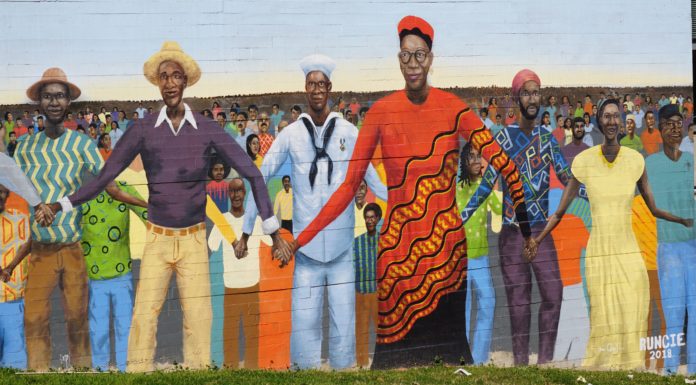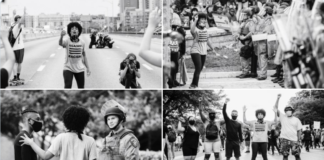
Editor’s note: This conversation on the week in Austin and the city leadership’s reaction to the local, national and international protests of police violence was conducted by Chelsea Collier with Meme Styles. Collier is the founder and CEO of Digi.City, a consultancy supporting use of urban technology. Styles is the founder and CEO of MEASURE, an Austin non-profit analytics company using data to study and monitor disparities in policing, health, education and economic opportunity.

Chelsea Collier: We are all being called to acknowledge truths about our Austin community that many have ignored and tolerated for far too long. These truths are about racism, about unequal access for people of color and about a militarized police force that, on the weekend leading up to June 1st, revealed its role as predator and not protector.
In order to understand and acknowledge reality, we must see it in its raw form and in real time. This is the primary motivation for my focus on smart city technology as a tool to address social and civic issues. In order to make change, we must first see and show that which must be changed.
There are many in our community who are collecting data for the right reasons. In addition to the protestors that captured video footage of the past week, Meme Styles and her team at MEASURE are turning to data to reflect the real Austin. Their work presents an opportunity for everyone to renew their commitment to equity. New and powerful technology-enabled tools can support the evolution until everyone in our city has equal access to opportunity. It is my honor to showcase MEASURE’s critical work.
— The conversation: Chelsea Collier and Meme Styles —
Collier: Ms. Styles, thank you for committing the time and energy to share your work. Please tell us more about Measure.

Meme Styles: MEASURE works to use data and education to empower communities to eliminate social disparities. Through our CARE Model process, we ensure that lived-experience data of marginalized populations is leveraged by communities and institutions to design and implement equitable solutions to address social disparities.
Collier: What is the opportunity that you see before us?
Styles: Data is not used effectively or collaboratively in the social justice ecosystem. As a result, the lived experience of people of color is underestimated as a vital resource for equitable planning, evaluation and policy. MEASURE empowers people impacted by social, economic, and political disparities to deconstruct underlying narratives and work together to find equitable solutions.
Collier: What role does big data play in community policing?
Styles: Two concepts, “Big Data” and “Community Policing,” bring students, community leaders, researchers, thought leaders and law enforcement together to explore data and best practices. What began as an educational event has evolved and emerged as a biannual conference that showcases data storytelling and the work done in our chapters.
Participants learn directly from a variety of stakeholders, including experts in evidence-based policing and design thinking, about the advancements in smart policing initiatives and modern technology adoption. Participants also network and exchange ideas with pioneers in the evidence-based discipline and community policing fields from across the regional community and nationwide. They gain access to leading research in evidence-based and community policing fields, and hear it from the researchers and practitioners who are implementing it themselves.
This collection of voices share and discuss the importance of big data and community policing practices, and how each of them are utilizing the techniques in their own fields. As we grow this conference, we envision engaging many chapters from college campuses, and including the students in the development of content. We also envision the event as being a great way for college students to connect professionally with potential employers.
Collier: On June 3, the Center for the Study of Race and Democracy at the University of Texas at Austin hosted a virtual event, “Justice and Equity in Austin in a Time of National Racial Crisis: A Community Discussion.” What are your thoughts on the discussion?
Styles: The discussion provided space for vulnerability from those in leadership positions who we typically expect to have all of the answers. It’s humbling to see that everyone is processing this global virus and racism in almost the same way….with hurt, confusion, empathy and compassion.
Collier: The Center’s Director, Professor Peniel Joseph made a firm statement that ‘no one has done enough’. Do you agree with this statement? If yes, what must we do, who needs to do it and who do you believe needs to lead the charge?
Yes. Black folks’ trauma has been historically overlooked and never cared about. Reparations could have been, and should still be, a form of atonement for the hijacking of opportunity and life that we’ve suffered for generations. Everyone matters in this fight for justice but the priority to lead should be Black people and especially Black women.
Collier: Mayor Steve Adler stated “We have done more than any other city that I know of” related to addressing systemic racism. Does the data support this statement?
Styles: Austin has anecdotally done great anti-racism work and has a great framework for change with the Mayor’s Task Force on Institutional Racism and Systemic Inequities Report
(published April 6, 2017). But the data paints a very different picture. Austin is still one of the more economically segregated cities in America. Our zip code, in many cases, determines our health. COVID-19 exposed the truth and validity of that. Our former chief of research at MEASURE led a survey that found and highlights those disparities.
Collier: Do you believe that the city has positioned itself to prioritize race and injustice? What do you believe needs to be done to translate ‘hope’ into real, measurable action?
Styles: There is so much that needs to happen but the good thing is that it CAN be done. We need a reformist in the position of police chief. One that is able to challenge the thin blue line to make it more inclusive of humanity. We need to ensure we enact all eight of the policies outlined in Campaign Zero’s #8cantwait.We need to create systemic change in school policy to protect Black girls and all children to fight the school-to-prison pipeline.
Collier: Austin City Council Member Natasha Harper-Madison stated “We have two Austins.” Do you agree with this statement? If yes, what are the actions to bridge these two communities?
Styles: We absolutely do have two Austins. This is true both physically and symbolically. The Central and East Side of Austin are areas that are still living in the effects of red-zoning policies that took place in 1937, that of course followed on the city’s racist and segregationist ‘Master Plan” of 1928. These boundaries enable micro-segregation and exacerbate the impacts of gentrification and the displacement of marginalized communities
The actions that we need to take include making calls, filling out community surveys and making your voice heard. We can also all commit to supporting black-owned businesses. There are also opportunities to volunteer with organizations working to dismantle the inequities and systematic oppression/racism. Above all, we must educate everyone in our community. We must learn from the numbers and use those numbers to share the real lived experiences of people of color.
______
Collier: In conclusion, the takeaways from the week are many amid the reaction by the city’s leadership to the protests of the most recent killings, including George Floyd in Minneapolis, Breonna Taylor in Louisville and Michael Ramos here in Austin, and the ongoing strife and unrest. Austin is proud of itself as a city and some of those accolades are well deserved. But we are far too quick to pat ourselves on the back and bypass the egregious wrongs that are far too evident for far too many. We like to celebrate Austin’s hipness by declaring we are, “so close but so far out.” Yet even in this, we fail to acknowledge an important legacy. The phrase “far out” is an example of cultural appropriation with origins in black jazz culture of the 1920s, referring to that which is beyond comparison. This is just yet another reminder of just how far out of touch Austin can sometimes be.
People of color suffer in our city and the results are life altering if not life threatening. Access to good education, to healthcare, to healthy food, to technology, to public safety and security is not the same in East Austin as it is in West Austin.
It is time to acknowledge this reality and it is beyond time to do something about it. Learn more about the many initiatives underway at MEASURE and support this important work. We are fortunate to have these dedicated advocates in our community. This organization is doing their part and it is past time for all of us to do ours.
If you like what you’ve been reading, please click here to subscribe and we will send you updates and our newsletter.





